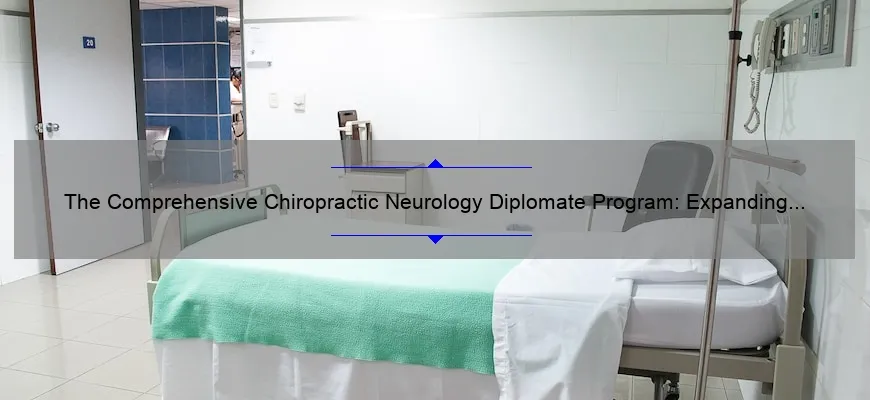The Chiropractic Neurology Diplomate Program is a post-graduate educational program aimed at chiropractors seeking advanced knowledge and skills in clinical neurology. It involves comprehensive study, practical training, and passing of examinations to earn the prestigious diplomate status in chiropractic neurology.
What is a Chiropractic Neurology Diplomate Program?
A Chiropractic Neurology Diplomate Program is an advanced training program specifically designed for chiropractors who want to specialize in neurology. It involves extensive additional education and clinical experience focused on diagnosing and treating disorders of the nervous system, including the brain, spinal cord, and peripheral nerves. This program aims to provide chiropractors with advanced knowledge and skills in neurology to effectively manage conditions such as headaches, movement disorders, neuropathies, and other neurological conditions. Upon completing the program, chiropractors are awarded diplomate status in chiropractic neurology, signifying their expertise in this specialized field.
Why pursue a Chiropractic Neurology Diplomate Program?
There are several reasons why someone may choose to pursue a Chiropractic Neurology Diplomate Program.
1. Advanced knowledge and expertise: The program provides in-depth knowledge and specialized training in the field of chiropractic neurology, allowing chiropractors to develop advanced skills and expertise in working with patients who have neurologically-based conditions.
2. Improved patient outcomes: By completing the program, chiropractors can enhance their ability to assess, diagnose, and treat a wide range of neurologically-related issues. This can lead to improved patient outcomes and satisfaction.
3. Expanded scope of practice: A Chiropractic Neurology Diplomate Program can open up new opportunities and expanded scope of practice for chiropractors. They can work more effectively with patients suffering from neurological disorders, traumatic brain injuries, movement disorders, and many other conditions.
4. Increased credibility and recognition: Obtaining a diplomate status in chiropractic neurology demonstrates a higher level of proficiency and expertise in the field. This additional credential can enhance a chiropractor’s professional reputation, credibility, and recognition among peers and patients.
5. Continuous professional development: The program provides ongoing professional development opportunities, keeping chiropractors abreast of the latest advancements, research, and treatment protocols in the field of chiropractic neurology. This allows practitioners to stay current and ensure the best possible care for their patients.
Overall, pursuing a Chiropractic Neurology Diplomate Program can enhance a chiropractor’s knowledge, skills, and career prospects in the field of neurology, ultimately leading to improved patient care and outcomes.
What are the eligibility requirements for a Chiropractic Neurology Diplomate Program?
The eligibility requirements for a Chiropractic Neurology Diplomate Program may vary depending on the specific program or organization offering it. However, some common eligibility requirements may include:
1. Applicant must hold a Doctor of Chiropractic (DC) degree from an accredited chiropractic college.
2. Valid license to practice chiropractic in the jurisdiction where the program is offered.
3. Completion of specific prerequisite coursework, such as neurology, neuroscience, and related subjects.
4. Minimum years of clinical experience as a licensed chiropractor, which may range from 2 to 5 years.
5. Submission of a detailed application including references, curriculum vitae, and personal statement.
6. Successful completion of an entrance examination or interview process.
7. Payment of program fees and commitment to meet all program requirements and obligations.
8. Maintenance of professional liability insurance.
It is important to review the specific requirements of each program to determine the eligibility criteria.
How long does it take to complete a Chiropractic Neurology Diplomate Program?
The duration of a Chiropractic Neurology Diplomate Program can vary depending on the specific program and the individual’s schedule. Typically, these programs can range from several months to a few years to complete. It is recommended to consult the specific program or institution offering the diplomate program for more accurate information on the duration of their program.
What are the key components of a Chiropractic Neurology Diplomate Program?
The key components of a Chiropractic Neurology Diplomate Program are:
1. Neurology education: A comprehensive understanding of neuroanatomy, neurophysiology, and neurology principles is taught to develop the knowledge base required for the program.
2. Clinical training: The program includes practical hands-on training to apply the principles of chiropractic neurology in a clinical setting. This involves diagnosing and treating various neurological disorders and conditions.
3. Case studies: Case studies provide an opportunity to analyze and apply theoretical knowledge to real-life patient scenarios. They help in developing problem-solving skills and decision-making abilities.
4. Functional neurology assessment: Trainees learn how to perform detailed neurological examinations to accurately assess the function of the nervous system. Testing techniques may include balance assessment, eye movement evaluation, reflex testing, and more.
5. Treatment modalities: Different treatment methods are taught, such as neurological rehabilitation exercises, chiropractic adjustments, nutritional counseling, and other non-invasive interventions aimed at improving brain-body connections.
6. Evidence-based practice: The program emphasizes the use of research and evidence-based techniques to support diagnostic and treatment decisions. Trainees learn how to critically evaluate and interpret scientific literature in the field of chiropractic neurology.
7. Interdisciplinary collaboration: Chiropractic neurology often involves collaboration with other healthcare professionals. The program focuses on promoting effective communication and teamwork with physicians, physical therapists, and other relevant specialists.
8. Certification examination: To obtain the Chiropractic Neurology Diplomate certification, trainees must pass a rigorous examination that assesses their knowledge, clinical skills, and ability to apply chiropractic neurology principles effectively.
How does a Chiropractic Neurology Diplomate Program benefit chiropractors’ clinical skills?
A Chiropractic Neurology Diplomate Program benefits chiropractors’ clinical skills by providing them with advanced training and knowledge in the field of neurology. This specialized program allows chiropractors to better understand and diagnose conditions related to the nervous system, such as neurological disorders, brain injuries, and spinal cord injuries. It equips chiropractors with a deeper understanding of the complex relationship between the spine and the nervous system, enabling them to develop more effective treatment plans and interventions for their patients. Additionally, this program helps chiropractors improve their communication skills, as they learn how to effectively educate patients about their conditions and treatment options. Overall, a Chiropractic Neurology Diplomate Program enhances chiropractors’ clinical skills by expanding their expertise in neurology and enabling them to provide more comprehensive and specialized care to their patients.
Are there any specialized areas of study within a Chiropractic Neurology Diplomate Program?
Yes, there are specialized areas of study within a Chiropractic Neurology Diplomate Program. These may include but are not limited to clinical neurology, neuroanatomy, neurophysiology, neuroimaging, neurodevelopmental disorders, neurorehabilitation, neuroplasticity, neurodegenerative diseases, and neuroendocrinology.
What are the career prospects after completing a Chiropractic Neurology Diplomate Program?
After completing a Chiropractic Neurology Diplomate Program, individuals can pursue various career prospects. They may choose to work as chiropractic neurologists, specializing in diagnosing and treating disorders of the nervous system through manual therapies and other chiropractic techniques. Chiropractic neurologists often work in private practices, clinics, or rehabilitation centers.
Additionally, some individuals may choose to integrate their chiropractic neurology knowledge into other healthcare professions. They can work as healthcare consultants, advising on neurology-related issues and assisting in the development of patient care plans. They may also pursue research or teaching positions in academic institutions to contribute to the field’s knowledge and educate future healthcare professionals.
Overall, completing a Chiropractic Neurology Diplomate Program opens up opportunities to work directly with patients, enhance neurological healthcare practices, and contribute to advancements in the field.
How can I find a reputable institution or organization offering a Chiropractic Neurology Diplomate Program?
There are several ways to find a reputable institution or organization offering a Chiropractic Neurology Diplomate Program:
1. Research online: Start by searching online for institutions or organizations that offer Chiropractic Neurology Diplomate Programs. Look for websites, forums, or directories specific to chiropractic education and specialized neurology programs. This can provide you with a list of options to explore further.
2. Seek recommendations: Reach out to colleagues, mentors, or professionals in the chiropractic field who may have knowledge or experience with Chiropractic Neurology Diplomate Programs. They can provide you with recommendations based on their personal experiences or refer you to reputable institutions or organizations.
3. Professional associations: Contact relevant chiropractic professional associations such as the International Academy of Chiropractic Neurology (IACN), American Chiropractic Neurology Board (ACNB), or the Council on Chiropractic Neurology (CCN). These organizations often have a list of accredited institutions or organizations offering specialized chiropractic neurology programs.
4. Accreditation and certification: Look for institutions or organizations that are accredited or certified by recognized accreditation bodies or chiropractic associations. This ensures that the program meets certain standards of education and curriculum.
5. Reviews and testimonials: Read reviews or testimonials from current or past students of the programs you are considering. Online platforms, social media groups, or discussion forums related to chiropractic education may provide valuable insights into the quality and reputation of different programs.
6. Contact the program directly: Once you have a shortlist of potential institutions or organizations, reach out to them directly. Inquire about their curriculum, faculty expertise, clinical training opportunities, and accreditation status. This will help you evaluate their reliability and whether they meet your specific requirements.
Remember to thoroughly research and consider multiple options before making a decision. Evaluate factors such as program duration, cost, location, faculty expertise, and opportunities for practical training to ensure you choose a reputable program that aligns with your goals and aspirations.
Can chiropractors from any country participate in a Chiropractic Neurology Diplomate Program?
No, not all chiropractors from any country can participate in a Chiropractic Neurology Diplomate Program. The eligibility criteria and requirements for participation may vary depending on the specific program or organization offering the diplomate program. Some programs may have specific prerequisites or qualifications that must be met before chiropractors can participate. Additionally, there may be limitations based on licensure or specific regulatory requirements in different countries that could impact participation. It is best to consult with the specific program or organization offering the diplomate program to determine if chiropractors from a particular country are eligible.
Sure! Here’s an example of an HTML table with some useful data on the Chiropractic Neurology Diplomate Program:
“`html
| Program | Duration | Requirements | Benefits |
|---|---|---|---|
| Chiropractic Neurology Diplomate Program | 2 years |
|
|
“`
Feel free to modify and add more rows or columns to the table as needed.






